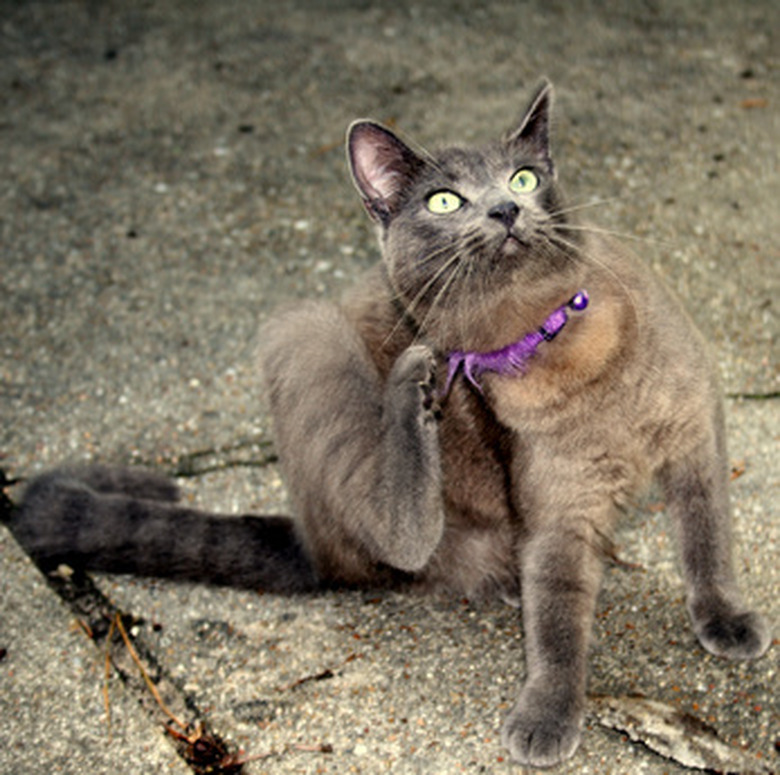Lawn Treatment For Fleas & Fire Ants
Fire ants and fleas are among the most unwelcome insects in any lawn. The bites and stings itch, making people and their household pets miserable. Dogs and cats often suffer from serious flea allergies. Fleas also carry disease such as plague, murine typhus and tapeworm. If your flea and fire ant infestation is extreme and you own pets, the lawn, house and pets must receive treatment on the same day in order to fully alleviate the problem. Once you've tackled treating your pets and home, you're ready to treat your lawn to prevent the infestation from re-invading your home.
Identification
Anyone can identify a flea problem by the itching red welts on their body or the scratching of pets. You might even see these minute black insects hopping around in the lawn and on your dog or cat. A flea bite can cause miserable itching for two weeks or more, so once identified, work to get rid of fleas in the lawn immediately.
- Fire ants and fleas are among the most unwelcome insects in any lawn.
- A flea bite can cause miserable itching for two weeks or more, so once identified, work to get rid of fleas in the lawn immediately.
You can easily identify a fire ant problem in your lawn by the mounds. These mounds lead right to the nest and the queen fire ant. Pets tend to get stung by fire ants when rolling in the grass. Fire ant stings are even more unpleasant than flea bites. Treat the problem right away.
Spray the Lawn for Fleas
Spray the lawn with malathion, diazinon, carbaryl (Sevin), or any other product your home and garden center may carry and recommend. Spray your bushes and shrubs as well. These chemicals work quite well, and the treatment should be repeated every spring to prevent problems. Unfortunately, effective organic methods of eliminating serious flea infestations don't exist. Fleas multiply rapidly, so you don't want to waste time trying a method that doesn't work.
- You can easily identify a fire ant problem in your lawn by the mounds.
Fire Ant Bait
Fire ants are considered beneficial insects because they eat fleas and ticks, but they produce painful stings that swell and cause prolonged itching. Time the treatment of fire ants in your yard. Treat fire ants before mounds appear in your lawn if possible. Will Hudson, a professor with the UGA College of Agricultural and Environmental Sciences, recommends applying baits at the beginning and end of the fire ant season: April and September. This catches the ants during the warmest months of the year when they are most active. Fire ant bait can be applied to the entire yard or applied to the mounds. The ants take it back to the nest and dine on it, sharing it with the queen fire ant. Ask neighbors with fire ant problems to treat their lawns at the same time because this is the most effective way of eliminating fire ants. Apply the bait to dry ground and grass when ants are active and there's no chance of rain within a 24-hour period.
- Fire ants are considered beneficial insects because they eat fleas and ticks, but they produce painful stings that swell and cause prolonged itching.
- Apply the bait to dry ground and grass when ants are active and there's no chance of rain within a 24-hour period.
Spraying for Fire Ants
According to Hudson, the best way to eliminate fire ants from the lawn is with a liquid, registered product mixed with water and sprayed with a garden hose. Malathion, diazinon, and carbaryl (Sevin), which are used to kill fleas, also kill fire ants. Follow the manufacturers instructions on the label carefully when using these products.
Granules or Dust Chemicals for Fire Ants
Pour granular insecticides mixed with water over the mound slowly and drench the nest. Or, sprinkle granules on top of and around the mound without disturbing it, and then pour water over the mound. The granules must penetrate the soil thoroughly in order to kill the ants.This will kill the fire ants within a day. Always follow the manufacturers directions on handling and mixing insecticides.
- According to Hudson, the best way to eliminate fire ants from the lawn is with a liquid, registered product mixed with water and sprayed with a garden hose.
- Pour granular insecticides mixed with water over the mound slowly and drench the nest.
Dust containing acephate applied to the mound evenly gets carried back to the nest and kills all ants within two or three days.
Organic Methods to Kill Fire Ants
According to Will Hudson, a professor with the UGA College of Agricultural and Environmental Sciences, pouring boiling water in the fire ant mound is an effective method of destroying a fire ant mound. However, be careful not to burn yourself, and make sure all children and pets are out of the way when carry boiling water to the yard.
